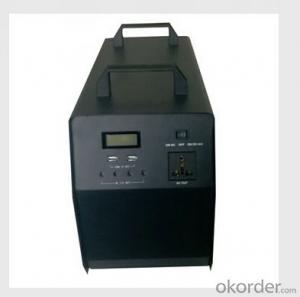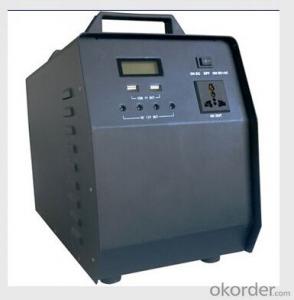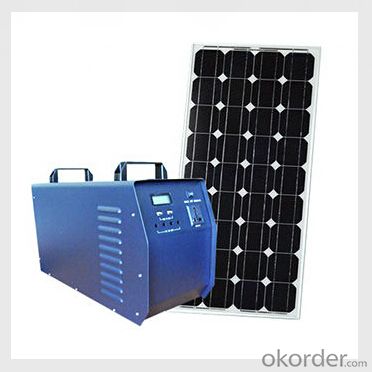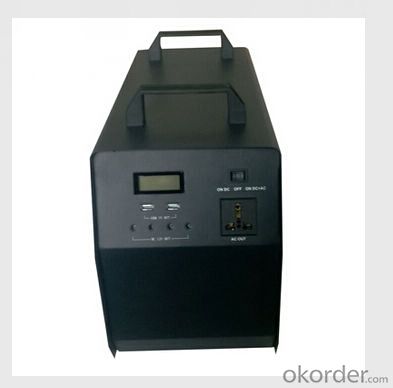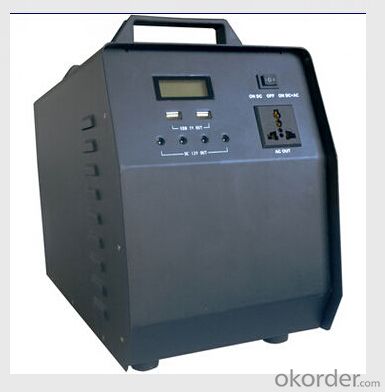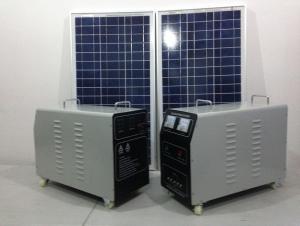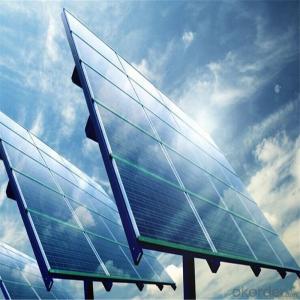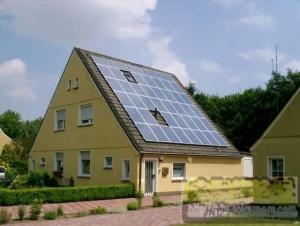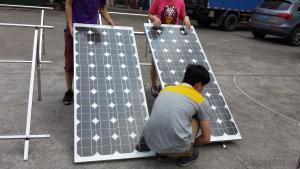Solar Home System Small Solar System 500W
- Loading Port:
- Shanghai
- Payment Terms:
- TT or LC
- Min Order Qty:
- 10000 set
- Supply Capability:
- 5000000 set/month
OKorder Service Pledge
OKorder Financial Service
You Might Also Like
Introduction of Solar Home System
Solar Home System is composed by Solar Panels, Inverters, Charger Controller, Battery, Cable, Mounting Bracket, which is applied to produce electricity for home use.
Solar Home System is quite suitable product in urban area and the place which is short of electricity. As the cost of solar products reduced, more and more family can bear the charge of solar products. These products apply to schools, hospitals, public halls and private housing, communication stations, weather station. Also can use as household appliances, lighting, communications equipment, meteorological equipment.
Our company’s main target is to make every family can use cheap solar energy and enjoy the new innovation of modern science and technology.
Picture of Our Factory

Working Principle of Solar Home System
This is an off-grid solar system which uses batteries to store the solar energy, at the same time, the solar system can be connected with the grid for utilization of grid power. The solar system uses battery power in priority, but when sunshine is not so good or loads consumption is too big which caused the battery power inadequacy, then the system can switch automatically to grid power supply. Meanwhile, the system can charge the batteries with grid power until batteries are fully charged. Then the solar system will switch back to battery power supply.
Product Details of Solar Home System
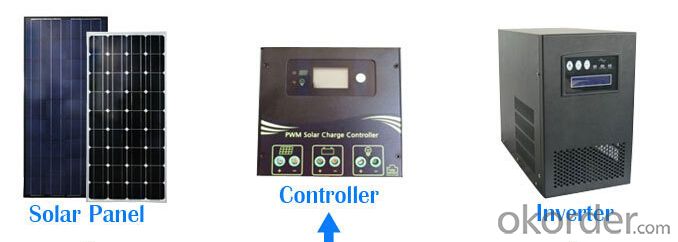
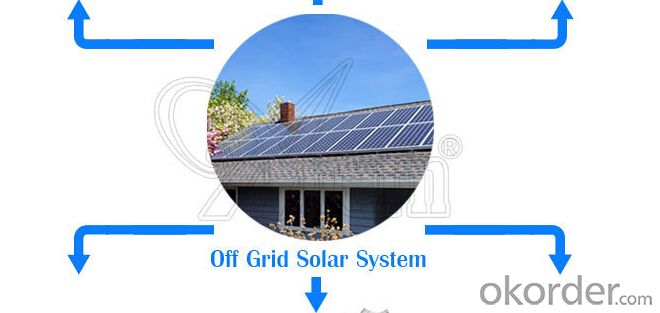

Working Principle of Solar Home System
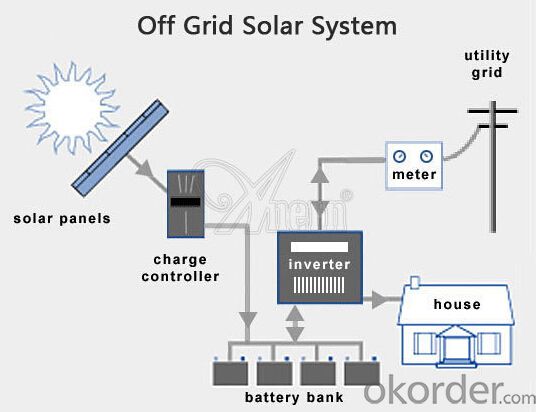
Specification of Solar Home System
Technical data: | |||||||||
Inverter | Rated load power | 500W | |||||||
Output wave | modify sine wave | ||||||||
Input voltage | 12V | ||||||||
Output voltage | DC:12V | ||||||||
Output frequency | 50HZ/60HZ | ||||||||
Precision of output frequency | ±6% | ||||||||
Solar panel | Pmax | 60W | |||||||
Vmp | 17.5V | ||||||||
Imp | 3.429A | ||||||||
Charger | Charger voltage & current | 12V10A | |||||||
Battery | Capacity | 12V38AH | |||||||
Power box | Spray paint iron box, input, output, ammeter, voltmeter, master switch and so on | ||||||||
Package data: | |||||||||
Part | Size (L*W*H mm) | Weight (kg) | 20' (pcs) | 40' (pcs) | |||||
Power box | 520*220*430 | 35 | 140Sets | 320Sets | |||||
Solar panel | 790*700*50 | 7 | |||||||
Solar panel bracket |
|
| |||||||
Loading electrical equipment(For consult) | |||||||||
Name of Load | Power(W) | Quantity | Working Time per Day (H) | Working Days | |||||
Color TV | 65W | 1 | 1 | 2 days | |||||
Satellite TV Receivers | 25W | 1 | 1 | 2 days | |||||
lamp | 11W | 2 | 6 | 2 days | |||||
Other | 150W |
| 1 | 2 days | |||||
Advantage of Our Solar Home System
1 Excellent Performance: Our Solar Home System is composed by Brand Standard Kits with high quality. Our solar system has the advantage of high efficiency and stable operation. We can ensure our product with a long life period.
2. Small Orders Accepted: We can accept small orders as our customer’s trial order.
3. Guarantee/Warranty: We supply 10 Years Product Warranty and 25 Years Performance warranty.
4. Warehouse: We have warehouse overseas which can bring great convenience to our customer to pick up the products.
- Q: Can solar energy systems be used for powering research laboratories or scientific facilities?
- Yes, solar energy systems can definitely be used for powering research laboratories or scientific facilities. Solar power can provide a reliable and sustainable source of electricity to meet the energy needs of these facilities. It can help reduce their carbon footprint, lower energy costs, and provide a more secure and independent energy source. Additionally, advancements in solar technology and energy storage systems have made it possible to generate and store enough power to meet the high energy demands of research laboratories and scientific facilities.
- Q: How does a solar energy system work?
- A solar energy system works by harnessing the power of sunlight and converting it into usable electricity. It typically consists of solar panels, which are made up of photovoltaic cells that absorb sunlight and convert it into direct current (DC) electricity. This DC electricity is then converted into alternating current (AC) electricity through an inverter, making it compatible with the electrical grid or for direct use in homes or businesses. The generated electricity can be used immediately or stored in batteries for later use.
- Q: Can solar energy systems generate power during cloudy days?
- Yes, solar energy systems can still generate power during cloudy days, although their efficiency may be reduced compared to sunny days. Solar panels can still capture and convert sunlight into electricity even when it's cloudy, albeit at a lower rate. Advances in technology have made solar panels more efficient in low light conditions, allowing them to generate some power even on overcast days. However, the overall output of solar energy systems can significantly vary depending on the density of clouds and the type of solar panels used.
- Q: How long does it take to recoup the investment in a solar energy system?
- The time it takes to recoup the investment in a solar energy system can vary depending on factors such as the cost of the system, the amount of energy it generates, the local electricity rates, available incentives, and the individual's energy consumption. On average, it typically takes around 5 to 10 years to recoup the initial investment in a residential solar energy system. However, with decreasing equipment costs and increasing government incentives, this payback period is continually reducing, making solar energy a more financially viable option for many individuals and businesses.
- Q: Are there any risks of electrical shock with solar energy systems?
- Solar energy systems carry potential risks of electrical shock. While generally considered safe, these systems can be hazardous due to the presence of high voltages and electrical currents. Failure to handle or manage them properly can result in accidents. Several key risks are associated with solar energy systems: 1. Installation and maintenance: Improper procedures during the installation and maintenance of solar panels can lead to contact with live electrical components. This can happen when safety protocols are not followed or when untrained individuals attempt to handle electrical connections. 2. Equipment or wiring malfunctions: Defective inverters, wiring, or other equipment can increase the risk of electrical shock. Poor installation practices or insufficient maintenance can also result in electrical faults, exposing individuals to dangerous currents. 3. Fire hazards: While not directly related to electrical shock, faulty electrical components or wiring can raise the risk of fires in solar energy systems. Attempting to extinguish such fires without shutting down the electrical system first can further worsen the risk of electrical shock. To minimize these risks, it is essential to adhere to proper installation and maintenance procedures. This often involves seeking assistance from licensed professionals. Furthermore, individuals working with solar energy systems should be trained in safety protocols, including the use of appropriate personal protective equipment and ensuring proper grounding of electrical systems. Regular inspections and maintenance are also crucial to detect and address any potential electrical hazards.
- Q: How does the efficiency of solar panels vary across different manufacturers?
- The efficiency of solar panels can indeed vary across different manufacturers. There are several factors that contribute to this variation. Firstly, the quality and type of materials used in the production of solar panels can greatly impact their efficiency. Manufacturers may use different types of silicon, such as monocrystalline or polycrystalline, which have varying degrees of efficiency. Monocrystalline silicon panels tend to have higher efficiency rates compared to polycrystalline ones. Secondly, the manufacturing processes employed by different companies can affect the efficiency of their solar panels. Some manufacturers may have more advanced and precise techniques, allowing them to produce panels with higher efficiency. This includes factors such as the thickness of the silicon layers, the quality of anti-reflective coatings, and the precision of cell alignment. Thirdly, research and development efforts play a significant role in improving the efficiency of solar panels. Some manufacturers invest heavily in research to develop new technologies and techniques that enhance panel efficiency. This can result in more efficient solar cells and improved overall panel performance. Moreover, product design and engineering also contribute to the efficiency variation among different manufacturers. Some companies may focus on optimizing the panel design for maximum light absorption and reduced energy losses, leading to higher efficiency. This includes factors such as the number and arrangement of cells, the size and spacing of busbars, and the integration of bypass diodes. Additionally, the level of quality control and testing procedures implemented by manufacturers can impact panel efficiency. Companies that have stringent quality control measures and comprehensive testing protocols are more likely to produce panels with higher efficiency rates, as they can identify and minimize any defects or issues during the production process. Lastly, it is worth noting that the efficiency of solar panels is also influenced by external factors such as temperature, shading, and orientation. Different manufacturers may have varying levels of tolerance to these external factors, resulting in different performance levels under real-world conditions. Overall, the efficiency of solar panels can vary across different manufacturers due to factors such as material quality, manufacturing processes, research and development efforts, product design, quality control, and external factors. It is important for consumers to consider these factors when comparing solar panels from different manufacturers to ensure they choose the most efficient option for their specific needs.
- Q: How do solar energy systems affect energy bills?
- Solar energy systems can significantly reduce energy bills by generating electricity from the sun, thereby reducing the reliance on grid-supplied power. With solar panels installed, homeowners can generate their own clean and renewable energy, resulting in lower consumption of electricity from the utility company and subsequently lower energy bills. In some cases, solar energy systems can even generate excess electricity that can be sold back to the grid, further reducing energy costs.
- Q: Can solar energy systems be used in powering outdoor signage or billboards?
- Yes, solar energy systems can be used to power outdoor signage or billboards. Solar panels can be installed on the roof or nearby structures to harness sunlight and convert it into electricity. This electricity can then be used to power the lights or digital displays of the signage or billboards, making them completely independent of the traditional power grid. Solar energy systems are particularly suitable for outdoor signage as they are often located in areas with abundant sunlight. Additionally, using solar energy helps reduce the carbon footprint associated with traditional electricity generation, making it an environmentally friendly choice.
- Q: Can solar energy systems be used in areas with frequent hurricanes?
- Yes, solar energy systems can be used in areas with frequent hurricanes. However, it is important to design and install them in a way that takes into account the specific challenges posed by hurricanes, such as high winds and potential debris impact. Reinforced mounting systems, robust solar panels, and proper installation techniques can help ensure the durability and resilience of solar energy systems in hurricane-prone areas. Additionally, incorporating battery storage can provide energy backup during power outages caused by hurricanes.
- Q: Can solar energy systems be used in agricultural settings?
- Yes, solar energy systems can definitely be used in agricultural settings. In fact, the use of solar energy in agriculture has been gaining popularity in recent years. Solar panels can be installed on rooftops or as ground-mounted systems in agricultural fields to generate clean and renewable electricity. There are several ways in which solar energy can be utilized in agricultural settings. One common application is to power irrigation systems. Solar-powered water pumps can efficiently draw water from wells or other water sources and distribute it for irrigation purposes. This helps farmers reduce their dependence on fossil fuel-powered pumps and lowers their overall energy costs. Solar energy can also be used to power electric fences, lighting systems, and ventilation systems in livestock operations. These systems help improve the conditions for animals, enhance productivity, and reduce the environmental impact of traditional energy sources. Additionally, solar energy can be utilized for crop drying and processing. Solar dryers can be used to remove moisture from crops, reducing the risk of spoilage and improving their shelf life. Solar-powered processing equipment, such as grain mills and oil presses, can also be employed to enhance the efficiency and sustainability of agricultural operations. Moreover, solar energy systems can provide a reliable source of electricity to remote agricultural areas that are not connected to the grid. This enables farmers to access modern technologies and improve their productivity and income. Overall, the integration of solar energy systems in agricultural settings offers numerous benefits. It reduces greenhouse gas emissions, decreases reliance on fossil fuels, lowers energy costs, improves efficiency, and enhances the sustainability of agricultural practices. Therefore, solar energy is a viable and promising option for powering various agricultural activities.
Send your message to us
Solar Home System Small Solar System 500W
- Loading Port:
- Shanghai
- Payment Terms:
- TT or LC
- Min Order Qty:
- 10000 set
- Supply Capability:
- 5000000 set/month
OKorder Service Pledge
OKorder Financial Service
Similar products
Hot products
Hot Searches
Related keywords

